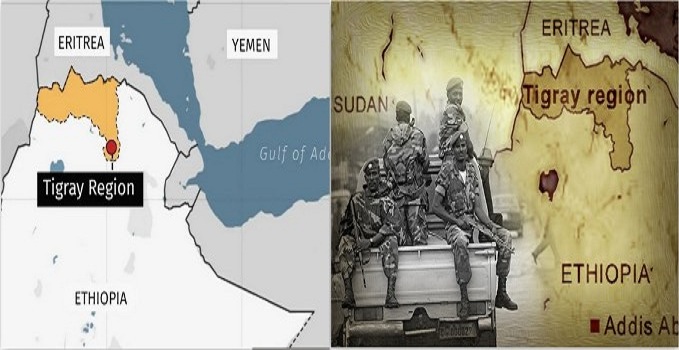Since November last year, the country of Ethiopia has been embroiled in a crisis that has grown from efforts to separate the country’s politics from the ethnic federalism and merging of the region-based and ethnic parties to a full scale armed conflict between the Tigray and National defence forces of Ethiopia. Reports have suggested that 500-600 have been killed on the Tigray side of the armed conflict.
There have been reports of extra-judicial killings and cases of war crimes in this civil war of sorts in the country located near the horn of Africa. This armed conflict has now managed to turn the heads of the UN security-council and the US administration. It has also seen the involvement of Eritrea opposing the Tigray movement.
Isaias Afwerki of Eritrea has been blamed for the escalating conflict in the Tigray region. A scholar from Tigray, Mulugeta Gebrehiwot, in a phone call has revealed that the Eritrean troops cut down mango orchards, razed down villages, dismantled the irrigation system, and have massacred many people across the age groups. Recently, Amnesty International had documented a November 2020 massacre in a cathedral in Axum, where the number of slaughtered went into hundreds. The Eritrean troops have been on their rampage across the town of Samre and the villages of Gijet, Adeba, and Tseada Sare. The scholar also added that “a famine is coming”, underscoring the grave situation in Tigray.
The peculiar nature of the army of Eritrea is giving leverage to Isaias Afwerki to spread his influence in north Ethiopia. Eritrean army is formed of 200000 personnel, with most of them enlisted in compulsory & indefinite national service, upon reaching the eleventh grade. This army which is basically built using a crude form of conscription, along with the locally dreaded national security & intelligence services is funded by around a fifth of the Eritrean budget. The expenditure for the Eritrean military is mostly obscure given that the country does not publish its budget. Using this military, Eritrea is helping the Ethiopian defence forces to carry out scorch-earth operations in the Tigray region.
Recently, the ousted leader of the Tigray region, the president of the Tigray people’s liberation front-Debretsion Gebremichael has accused the Ethiopian government and the allies like Eritrea of genocide and other crimes against humanity. The Eritrean soldiers were accused of firing in the Maryam Dengelat Church in the village of Dengelat. It has also been asserted in a note of accusation to Eritrean army that after the Ethiopian PM Abiy Ahmed had launched a military operation against the Tigray region, thousands of civilians have been killed by the defence forces of Ethiopia in collusion with armies of allies.
Subsequently, Antony Blinken, the US Secretary of State, had asked the Ethiopian PM, Ahmed, over a phone call to end the hostilities in the Tigray region. The Biden administration has identified the crisis originating from Tigray conflict as a deepening humanitarian crisis. Blinken also stated that PM Abiy Ahmed has been asked to allow an independent international investigation into the conflict. The communication from the US secretary of state is important in the current situation as the Tigray region has seen clampdown on reporting and many journalists were detained in the region, which has caused limited information to come out of there.
The issue of Tigray conflict was taken up at the UN by the Irish government. Following this, the issue of Ethiopia-Tigray would need the involvement and the cooperation from the African countries to be solved, an analyst based in UN has disclosed.
As per a UN expert, there are presently two situations for the UN to deal with the Tigray situation. The first is a more general resolution to be brought in the Security-Council and the general assembly meetings of the UN. The second one is a process that involves Resolution 2417, which specifically targets the situations where there can be a link between the conflict and food-insecurity. Other observers in the UN also stated that it is the responsibility of the African Union members to call out the situation in Tigray, and that the indifference to the situation & the grave circumstances are like regression and crimes against humanity in themselves.
UN Chief Antonio Guterres has asked Eritrea to remove its troops from the Tigray region, as there are accusations of human rights violations against them in the armed conflict in Ethiopia. But, the UN Security Council has failed to reach a conclusion because of divisions. The UN is worried that the Tigray-conflict can spill into other regions and escalate and exacerbate into a hunger crisis of catastrophic proportions.





